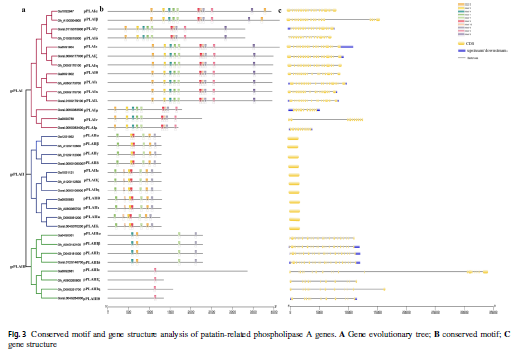Abstract:
pPLA (patatin-related phospholipase A) is a key enzyme that catalyzes the initial step of lipid hydrolysis, which is involved in biological processes, such as drought, salt stress, and freezing injury. However, a comprehensive analysis of the pPLA gene family in cotton, especially the role of pPLA in the response to drought and salt tolerance, has not been reported so far. A total of 33 pPLA genes were identified in this study using a genome-wide search approach, and phylogenetic analysis classified these genes into three groups. These genes are unevenly distributed on the 26 chromosomes of cotton, and most of them contain a few introns. The results of the collinear analysis showed that G. hirsutum contained 1–5 copies of each pPLA gene found in G. arboreum and G. raimondii. The subcellular localization analysis of Gh_D08G061200 showed that the protein was localized in the nucleus. In addition, analysis of published upland cotton transcriptome data revealed that six GhPLA genes were expressed in various tissues and organs. Two genes (Gh_A04G142100.1 and Gh_D04G181000.1)
were highly expressed in all tissues under normal conditions, showing the expression characteristics of housekeeping genes. Under different drought and salt tolerance stresses, we detected four genes with different expression levels. This study helps to clarify the role of pPLA in the response to drought and salt tolerance.
Key Words:
Cotton · Patatin-related phospholipase A gene family · Salt tolerance · Drought tolerance



